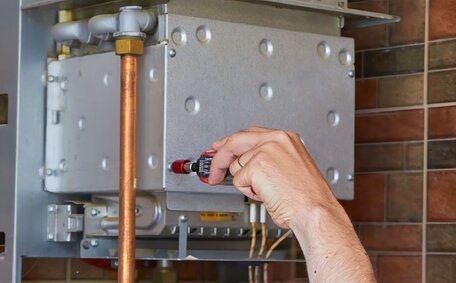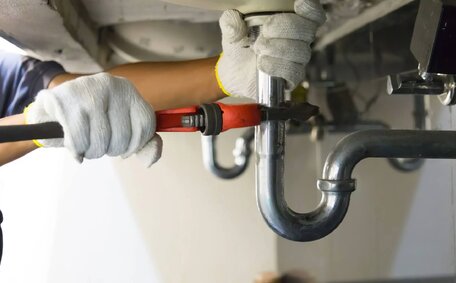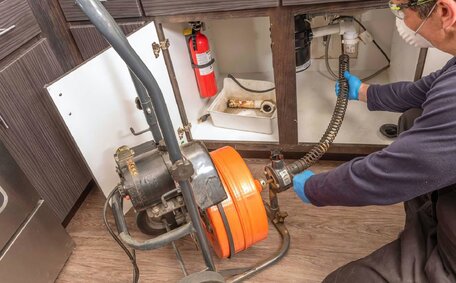Having appliances that run smoothly and safely on gas is crucial in every Sydney home. At Dulwich Hill Plumbing, we understand the importance of a properly functioning gas regulator. This unassuming device reduces the high incoming pressure from your gas supply down to a consistent, safe level for your appliances.
When your regulator is faulty, it can lead to a raft of issues including flames that are too low or high, the smell of gas, problems igniting appliances, and even dangerous gas leaks.
In this article, we’ll explore the common signs that your gas regulator needs attention. We’ll also provide steps for testing your regulator and determining if it needs to be reset or replaced. We service residents throughout Sydney’s Inner West including Dulwich Hill, Marrickville, Petersham, Lewisham and surrounding suburbs.
While some minor regulator issues can be addressed DIY-style, it’s critical to involve a licenced gas fitter for testing leaks, resetting regulators and replacements. At Dulwich Hill Plumbing, our fully certified gas fitters have the expertise to diagnose regulator issues and make any necessary repairs or upgrades.
Having your gas appliances running optimally gives you peace of mind while also saving you money on your energy bills. Read on as we explore some troubleshooting tips and maintenance advice for your gas regulator.
Signs of a Faulty Gas Regulator
A faulty gas regulator can cause a number of visible and audible issues. Here are some common signs that your regulator may need maintenance or replacement:
- Low flame - If the flames on your gas stove or other appliances are smaller or lower than expected, it likely indicates insufficient gas pressure.
- Inconsistent flame - Flames that are erratic or keep changing in size can point to inconsistent gas flow.
- Gas smell - Detecting the odour of gas around your appliances could signal a dangerous leak.
- Frost build-up - Cold spots or frost forming on the regulator or gas lines may occur when gas volume is too high.
- Hissing sounds - You may hear a hissing noise near the regulator as excess gas flows through.
- Ignition problems - It may become difficult to light appliances if gas flow is disrupted.
If you notice any of these signs, it’s important to have your gas regulator inspected by a licenced professional as soon as possible. Attempting to troubleshoot gas issues on your own can be extremely hazardous.
Testing for Gas Leaks
If you suspect a gas leak, it’s important to test for leaks before resetting your regulator or relighting appliances. Here is a simple way to check for leaks:
- Make a soap solution by mixing a few drops of dish soap with water.
- Turn off the gas supply and extinguish any flames or cigarettes.
- Apply the soapy solution with a brush or spray bottle on areas that could leak such as joints, connections and seals.
- Look closely for any bubbles forming. Bubbles indicate a gas leak.
- If you detect a leak, turn off the main gas supply immediately. Do not attempt to relight appliances.
- Install a carbon monoxide detector for extra monitoring of potential gas leaks.
- Call a professional LP gas technician to inspect and repair the leak safely.
Attempting to fix a gas leak yourself can lead to disastrous results. Always involve a qualified technician when gas leaks or regulator issues are suspected.
Resetting or Replacing the Regulator
When gas regulator issues persist after troubleshooting, the unit may need to be reset or replaced entirely. While this may seem like a DIY job, it requires the expert skills of a licenced gas fitter.
Resetting the regulator involves turning off the gas supply, bleeding excess gas from the regulator, adjusting the regulator to the proper pressure setting, then turning the gas back on and testing operation. If resets do not resolve the problems, the regulator will need replacing.
To replace a faulty regulator, a gas fitter will turn off the main gas supply and disconnect all fittings. The old unit is removed and a new regulator is installed to manufacturers specifications. Pressure tests are conducted to ensure safe operation before reconnecting the gas supply and relighting appliances.
Replacing outdated or damaged gas regulators provides optimal safety by restoring proper gas pressure. Upgrading to a more modern regulator also allows for greater efficiency and more consistent performance.
Our team at Dulwich Hill Plumbing handles regulator resets and replacements for households throughout Sydney’s Inner West. We obtain all required council permits for gas work. With our expertise, we can get your gas appliances running safely and efficiently again.
When to Call a Professional
Handling gas regulator issues requires extensive training and certification. While symptoms of a faulty regulator may seem minor at first, attempting repairs without proper qualifications can quickly escalate into dangerous territory.
If your troubleshooting has uncovered any of the following, immediate professional assistance is crucial:
- Detected gas leaks
- Inability to reset or turn the gas supply back on
- Inability to relight appliances after resetting
- Lingering gas smell
- Unresolved flame or ignition issues
Attempting to push through these regulator problems solo can have disastrous impacts. Propane gas and natural gas leaks lead to explosion risks, carbon monoxide poisoning, and other major safety hazards. Only experienced gas fitters have the expertise to address leaks and regulator malfunctions safely.
The team at Dulwich Hill Plumbing possesses advanced gas fitting accreditation. We respond promptly to any reports of gas leaks or regulator trouble. Our qualified technicians can efficiently diagnose issues and carry out required repairs, replacements or upgrades.
Do not hesitate to call our professional plumbers when faced with gas flow disruptions, the smell of gas or any other signs of regulator failure. We have a proven track record supporting homes and businesses across Sydney’s Inner West. With our help, your gas appliances will be running optimally again safely.
Maintaining Your Gas Regulator
To keep your gas regulator functioning safely for years to come, periodic maintenance is crucial. This preventative care can also help avoid many common regulator problems.
Here are some tips for maintaining your regulator:
- Have a licenced gas fitter inspect your propane tank regulator annually prior to the peak season. They will check for damage, leaks and proper gas output pressure.
- Periods of disuse can lead to stuck valves. Turn appliances on monthly to keep gas flowing through the regulator.
- Keep the vent on your propane regulator clear of dirt, debris and insects. This allows it to adjust gas pressure properly.
- Ensure the regulator is protected from weather exposure which can damage seals. Install a cover if needed.
- When reconnecting propane tanks after transporting, double check all fittings are tightened securely to prevent leaks.
- Position tanks and regulators at least 3 metres away from sources of heat, open flames or other ignition sources.
- Never attempt to modify or repair regulators yourself. Always contact a certified gas fitter.
- Replace old regulators. Newer designs are more efficient and less prone to wear and tear.
- Consider upgrading to a 2 stage regulator for more precise gas control with propane appliances.
At Dulwich Hill Plumbing & Gas, our technicians are highly experienced with inspecting, testing and maintaining gas regulators. We can ensure your regulator is operating safely and help address any issues promptly.
Don’t hesitate to contact us if you smell gas or suspect any problems with your propane regulator. We service all makes and models.






